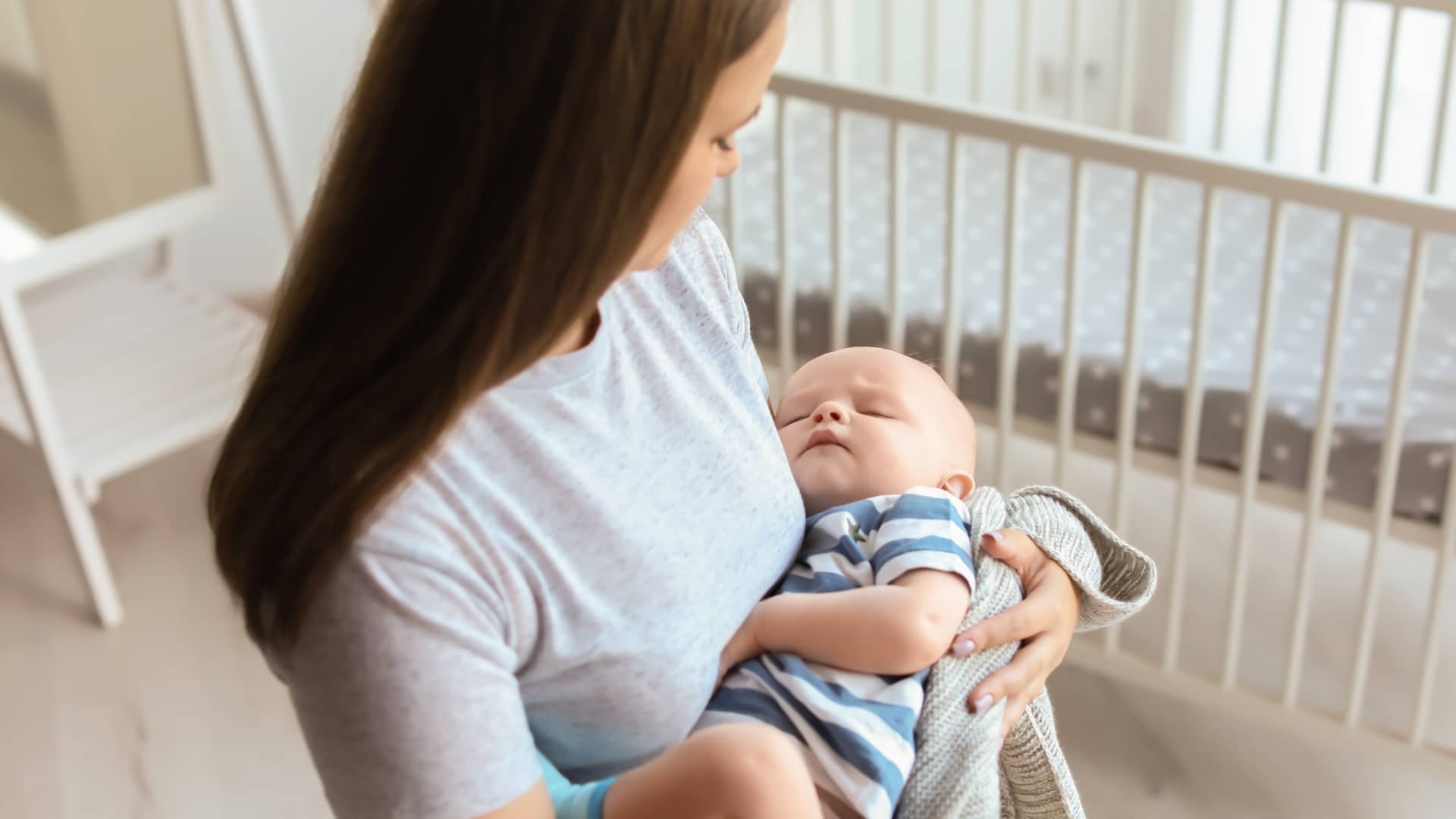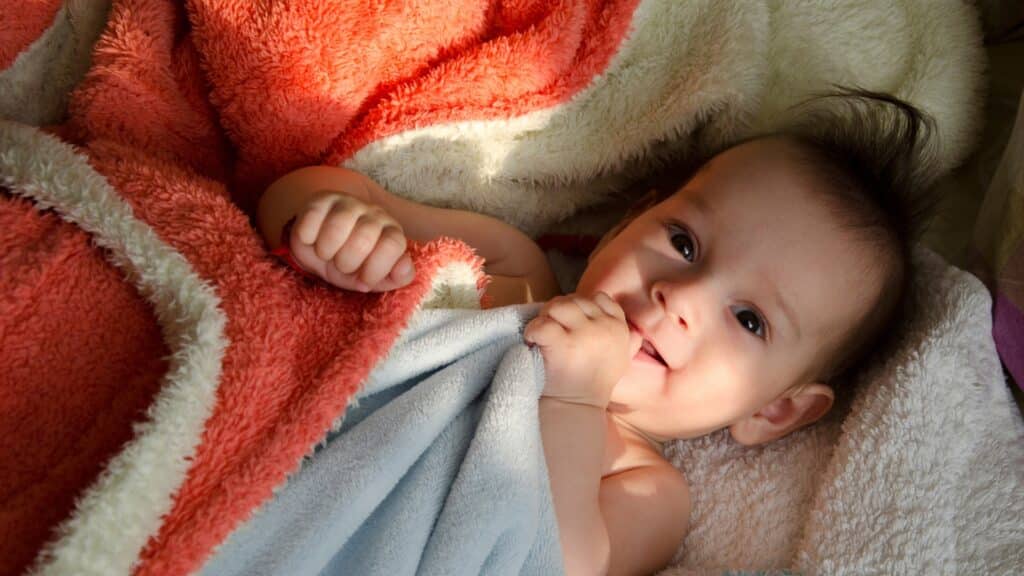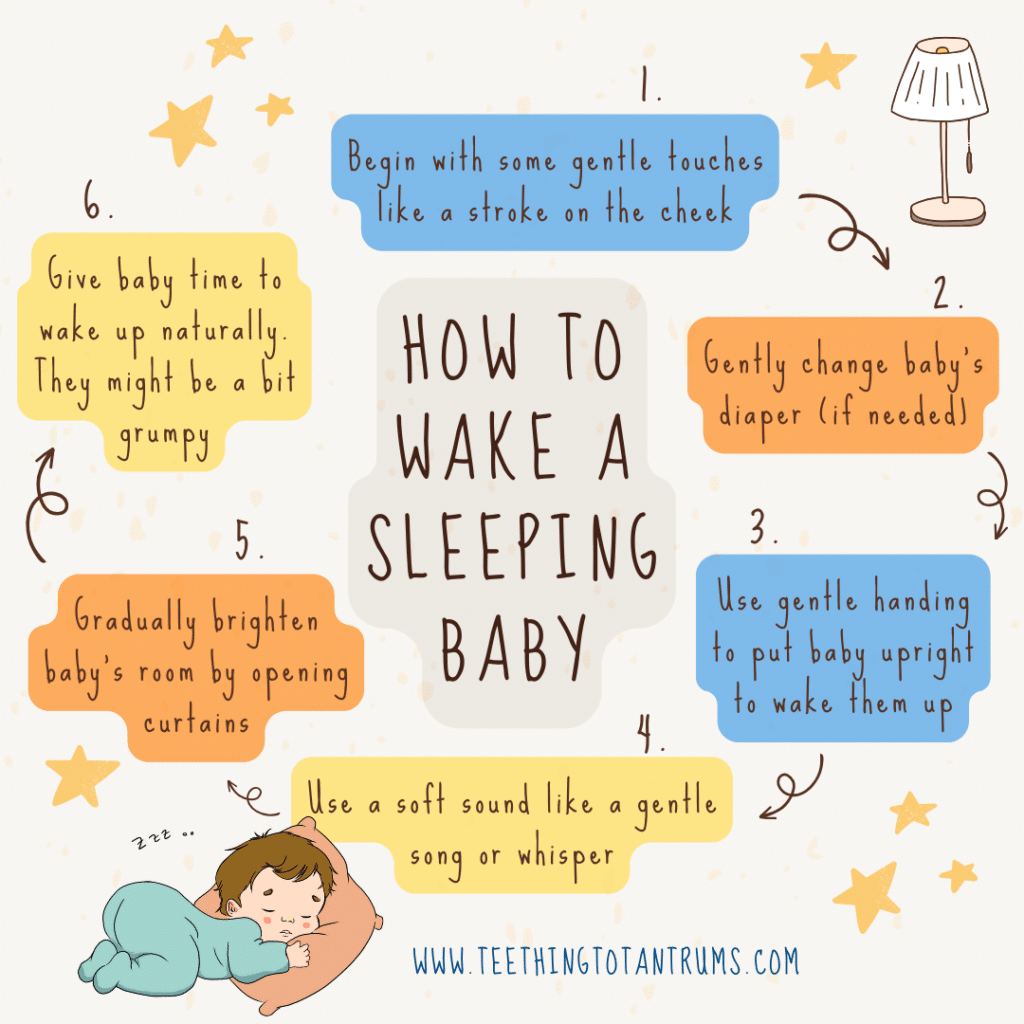As a parent, I know how precious sleep is. Especially when your baby is sleeping peacefully, and you’re so tempted to leave them to it.
But is that right? Or should you wake a sleeping baby to be fed? Should you wake a sleeping baby to change their diaper? Or should you just leave them to sleep in peace?
Here’s everything you need to know to ensure you and your baby thrive physically and mentally.

Table of Contents
How Much Sleep Does Your Baby Need?
Before you consider waking a sleeping baby, you need to understand the amount of sleep they require as this will greatly impact your decision.
Here’s how much sleep your baby needs:
| Age Group | Total Sleep Required |
| Newborn (0-3 months) | Average 14-17 hours |
| Infants (4-12 months) | Average 12-16 hours |
On average, newborns need 14-17 hours of sleep every 24 hours. This roughly equates to 8 hours of sleep during the day with the rest taken throughout the night.
However, this does vary widely from baby to baby with some newborns sleeping as little as 11 hours and others up to 20 hours a day.
As they grow, the total amount of sleep required decreases, and the nighttime sleep duration increases.
During the first few months, newborns have irregular sleep patterns as they have not yet developed a true sense of night and day. This means that for up to 12 weeks they will wake to be fed pretty regularly (every 3-4 hours) day and night.
By the time they reach 4 months of age, you should notice a more definite pattern with your baby sleeping for longer periods at night and for shorter periods during the day.
However, within the age range of 4 to 12 months, 12 to 16 hours of sleep is still expected and you must ensure your baby is getting enough sleep to support their healthy development.
NOTE: If your baby sleeps longer than the average and seems healthy, it may be normal for them. Likewise, if your little one appears to need less sleep but is not showing signs of overtiredness and is thriving, then less sleep may be normal for them.
Can Babies Sleep Too Much?
Yes, babies can sleep too much, but it’s a lot rarer than you might think.
Most of the time, the excess sleep is needed because your infant is:
- Feeling unwell
- Experiencing a growth spurt
- Teething – it can disrupt their nighttime sleep and make them need more daytime sleep to compensate.
- Recovering from social exposure – visiting friends and family can be very draining for young children.
These triggers will all pass and the extra sleep required will not linger.
NOTE: If your baby continues to sleep more than expected and is struggling to establish a healthy day-night sleep pattern for more than 10 days, you should consult with a pediatrician to rule out any underlying causes.
Should You Wake A Sleeping Baby?
Yes, you should wake a sleeping baby… But it’s not as straightforward as you might think.
I know from many years of looking after young babies that sleep is very precious and it can be incredibly tempting to leave your little one to sleep when they eventually do so.
However, I have also learned that babies need some guidance in getting sleep right.
Ideally, we want our young children to sleep more at night and at fixed times during the day.
Therefore, while deciding when to wake a sleeping baby can be challenging there are some clear guidelines to help.
Your aim should be to ensure your baby is getting the right amount of age-appropriate sleep at the right time and eating regularly to ensure they flourish both physically and mentally.

Should You Wake A Baby From A Nap?
I often advocate waking babies from a daytime nap if it’s too long. Primarily because it keeps your little one on a healthy sleep schedule and ensures they are ready for nighttime sleep when bedtime comes around.
You see, daytime sleep impacts hugely on nighttime sleep, so a bit of sleep-timing-engineering now is often necessary to help in the long run.
Remember that a regulated nap time helps establish and maintain your baby’s circadian rhythm and can prevent bedtime struggles.
Times to wake your baby from a nap would be:
- If they are in the early weeks and due a feed
- If they’re sleeping too late in the afternoon
- If you are trying to establish an age-appropriate sleep schedule
- If they are resisting bedtimes
- If you’re nap transitioning you may need to wake your baby early from the nap you are planning to drop
NOTE: I would not leave a newborn to sleep for longer than 4 hours without feeding until they are showing steady weight gain.
Should You Wake Baby In The Morning?
If your baby is sleeping past their usual wake time and it disrupts their daytime routine, yes, it is useful to wake them.
Babies that do not sleep well at night will often sleep later in the morning and then you can run into an issue whereby you end up with your whole sleep schedule running late.
This being said… if their ‘lie-ins’ are occasional and do not affect their daily schedule, let them rest.
This is especially true if there is an obvious reason for them sleeping later such as you have been traveling, they went to bed later than usual, or they had a bad night due to teething or being unwell.
Should You Wake A Baby To Feed?
During the first few weeks, yes, you should wake your newborn baby every 2-3 hours to feed.
As they grow you can drop this to every 3-4 hours to feed to until your pediatrician is happy with their weight gain.
After they’ve established a good feeding pattern, are showing signs of naturally sleeping longer at night, AND are gaining weight well, then I would leave them to sleep a bit longer.
It can often happen that your baby sleeps longer at night for a time for which you are extremely grateful… but that they suddenly start waking frequently at night again. This is more than likely due to your baby not having enough to eat during the day.
You can consider implementing a dream feed to help baby get through the night without getting hungry. Learn more here:
NOTE: I would be more inclined to wake a baby during the day to feed if they are sleeping longer at night to ensure that they are getting enough to eat and do not start waking more frequently at night due to hunger.
When To Stop Waking Baby To Feed
Stop waking your baby to feed when they have started to gain weight steadily and are feeding well during the day.
Usually, this is around the time they are 4 months old but always confirm with your pediatrician first.
Should You Change A Poopy Diaper If Baby Is Still Sleeping?
I would not specifically wake a baby just to change their diaper.
Usually, you will notice they need changing when they wake to feed and if they do have a dirty diaper you should most definitely change it before putting baby back down to sleep to reduce the chances of infection.
Your baby is less likely to re-settle if they are uncomfortable and a poopy diaper is not conducive to good sleep.
If you are requiring your baby to go back to sleep after the diaper change, make it quick and gentle with very little chat or stimulation. Once they are clean and fed they will usually settle back to sleep nicely.
NOTE: While breastfed babies tend not to suffer from diaper rash, formula-fed babies are more prone to this infection.
Should You Remove A Pacifier If Baby Is Sleeping?
If the pacifier falls out naturally and your baby remains asleep, there’s no need to reinsert it.
Likewise, there’s no need to remove a pacifier if your baby is sleeping peacefully.
In fact, the American Academy of Pediatrics (AAP) suggests that pacifiers may help prevent SIDS as babies don’t sleep as deeply when they have a pacifier, which helps wake them up if they’re having trouble breathing.
A pacifier also keeps the tongue forward in the mouth, so it can’t block the airway.
TOP TIP: According to the AAP “For breastfed infants, pacifier introduction should be delayed until breastfeeding is firmly established. Infants who are not being directly breastfed can begin pacifier use as soon as desired.”
Should You Wake A Sick Baby?
If your baby is sick they are likely to sleep more as this is the body’s natural way to recover. However, it is important to check on them regularly while they are sleeping to ensure they are not having any breathing issues and that they are comfortable (i.e.not too hot or too cold).
However, you should wake a sleeping baby for regular medications and hydration if and when prescribed by a doctor.

3 Times Should You Never Wake A Sleeping Baby
In your journey as a parent, you’ll learn to balance sleep schedules with your baby’s needs.
This will help you decide whether you should wake your baby from that afternoon nap, at night for a feed, or long lie-in due to a bad night’s sleep.
With that in mind, there are specific times when I would recommend that you should let your baby sleep.
- If your baby is sick and needs rest to recover, don’t interrupt their sleep – let them have the rest their body is asking for. As their immune system fights off the illness, sleep provides a critical healing function. Only wake baby for feeds and prescribed medication as required.
- Also if your baby is experiencing a growth spurt, they may sleep longer than usual. This is quite normal and is normally just a passing phase. During these spurts, a baby’s body works hard, and more sleep supports this intense period of growth.
- Lastly, if your pediatrician has confirmed that your baby is gaining weight and growing as expected, it’s usually fine to let them sleep and skip scheduled feeding at night. I would not necessarily recommend this during the day as this may lead to increased waking at night from hunger.
Remember, regular pediatrician visits will help guide your decision on whether to wake your baby for feedings or not.
Looking to get your little one to sleep quickly and effortlessly? Check out my Bedtime and Nap Cheat Sheet and master the art of making daytime naps and bedtimes as seamless as possible.
A bedtime & nap cheat sheet so good your little one will ask you to put them to bed...
Laura Williams "This is a life saver! I'm so glad I downloaded your bedtime & nap cheat sheet. My little one actually asked me to put him to bed last night! Unbelievable! Thank you so much!"
Click Here For The FREE Cheat Sheet
How To Wake A Sleeping Baby
If you do decide to wake a sleeping baby, here is the best way to go about it:

1. Begin With Gentle Tactile Stimulation
Initiating the wake-up process with a soft touch is a comforting way to start.
Lightly stroking the baby’s cheek or tickling their feet can be effective. Placing your hand on their tummy can also help wake them.
These subtle actions are less likely to cause distress and can gently coax the baby from sleep. The goal is to provide a soothing transition from sleep to wakefulness.
2. Consider A Diaper Change If The Initial Touch Is Ineffective
If the baby doesn’t respond to gentle touches, changing their diaper can be the next step.
The physical movement involved in a diaper change, along with the new sensations, can help stimulate the baby’s awareness.
It’s important to maintain a calm environment during the change to keep the baby relaxed without causing any alarm or discomfort.
3. Use Gentle Handling To Wake The Baby
Picking up the baby gently and holding them upright or changing their position can be a clear signal that it’s time to wake up.
This method is more direct, yet it still needs to be done with a gentle touch. Holding your little one gives physical reassurance and can help them transition to a state of alertness.
It’s a way of communicating through your actions that the rest period has ended.
4. Introduce A Gentle Auditory Stimulus
Sometimes, a soft sound can be just the right touch to wake a baby.
Speaking to them in a calm voice or singing softly can be familiar and reassuring. This auditory cue can help signal to your little one that it’s time to wake up without being too abrupt.
5. Use Lighting To Signal The End Of Naptime
A well-lit room suggests that it’s time to be awake and active. As baby’s eyes perceive the change in light, it can help their internal clock recognize the transition from night to day or from naptime to play.
I would avoid turning on a bright light but rather gradually increasing the light with a dimmer or night light, or pulling back the curtains to let natural light into the room.
6. Acknowledge That Your Baby Will Wake In Their Way
It’s so important to remember that babies have individual temperaments and responses to waking up. What works for one might not be effective for another, and it may take some trial and error to find the best method.
Over the years I have discovered that some babies always wake cheerily and positively while others are grumpy and take longer to wake properly.
Observing your baby’s reactions and adjusting your approach accordingly is part of the process.
Patience and attentiveness to your baby’s preferences will ultimately guide you to the most effective technique.
Frequently Asked Questions About Waking A Sleeping Baby
In this section, you’ll find clear answers to some common questions about your baby’s sleep.
Q: Should you let a baby nap for as long as they want?
A: It really depends on their age. For newborns, you will need to wake them to feed and for older babies, you will need to ensure that longer daytime naps do not interfere with bedtime and nighttime sleep. I would always recommend waking older babies from daytime naps to keep within their daytime nap allowance to ensure it does not impact their bedtime routine and nighttime sleep.
Q: How long is too long for a baby to nap?
A: Naps longer than two to three hours are probably too long for most babies, especially if they’re older than six months. Long naps can disrupt your baby’s sleep schedule and might lead to challenges with nighttime sleep.
It’s important to observe your baby’s behavior and overall sleep needs as they grow. If they missed the morning nap, for instance, then the afternoon nap can be a little longer than normal to avoid overtiredness at bedtime. The key is to be flexible and keep track of the total amount of sleep your little one is getting.
Q: Is it necessary to wake a baby for scheduled feedings at night?
A: Newborns often need to be woken up for feedings to ensure they’re getting enough to eat. But as they grow and their stomachs can hold more milk, they may not need to be fed as frequently at night. You should consult your pediatrician for advice tailored to your baby’s specific health and growth needs and weight gain.
Q: Are there specific reasons for which a baby should be woken up?
A: Yes, you might need to wake your baby if they’re sleeping for too long without feeding, especially in the first few weeks. Other reasons include medical advice, establishing a routine, or if they’ve reached a certain number of hours of daytime sleep. Always speak to your pediatrician if you’re unsure.
Q: How can waking up a baby impact their overall sleep pattern?
A: Waking a baby randomly can disrupt their sleep cycle and make it harder for them to fall asleep again… But, strategic wake-ups can help establish a better sleep routine. If you’re trying to modify your baby’s sleep habits, do so gradually, and expect some variation in their response to changes. It is also important to find the correct waking technique that suits your little one’s personality.
Need More Parenting Help?
- Download our FREE Perfect Sleep Cheat Sheet. It’s a free, easy-to-use and proven formula designed for parents of 0-5 year olds to master the art of consistently undisturbed and restful sleep without the yelling, nagging or exhausting long-winded evenings.
- Check out our Parenting Toolbox. You’ll get access to expertly-chosen products that you can guarantee are the best for your little one and your wallet.
- Ready to create the calm, peaceful evenings you deserve? Then checkout our most popular course - The Bedtime Battles Masterclass

A bedtime & nap cheat sheet so good your little one will ask you to put them to bed...
Laura Williams "This is a life saver! I'm so glad I downloaded your bedtime & nap cheat sheet. My little one actually asked me to put him to bed last night! Unbelievable! Thank you so much!"
Click Here For The FREE Cheat Sheet


